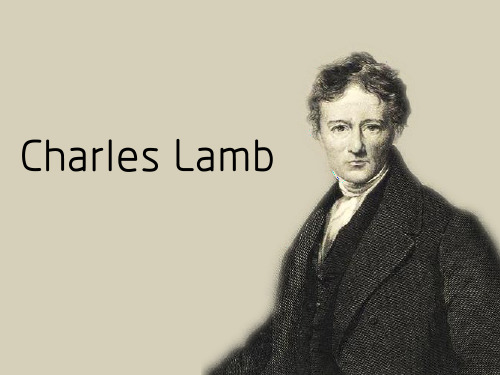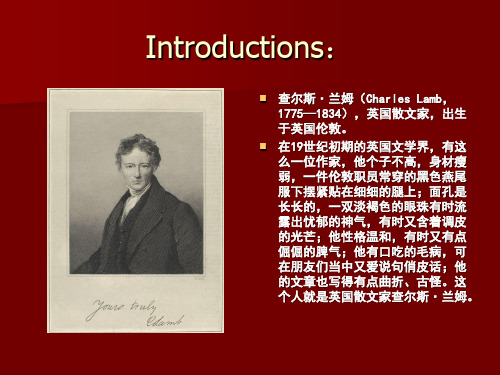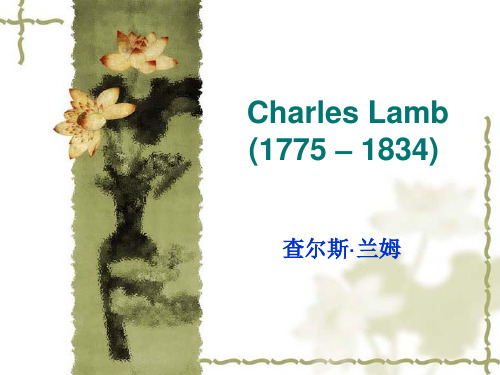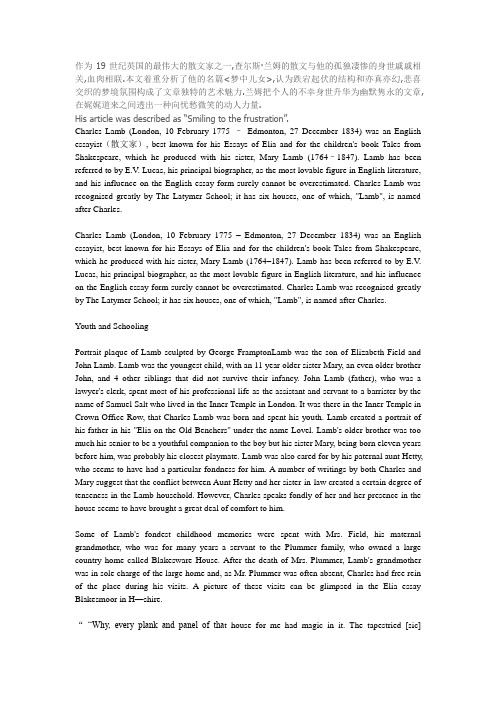查尔斯兰姆
- 格式:doc
- 大小:33.00 KB
- 文档页数:3





作为19世纪英国的最伟大的散文家之一,查尔斯·兰姆的散文与他的孤独凄惨的身世戚戚相关,血肉相联.本文着重分析了他的名篇<梦中儿女>,认为跌宕起伏的结构和亦真亦幻,悲喜交织的梦境氛围构成了文章独特的艺术魅力.兰姆把个人的不幸身世升华为幽默隽永的文章,在娓娓道来之间透出一种向忧愁微笑的动人力量.His article was described as “Smiling to the frustration”.Charles Lamb (London, 10 February 1775 –Edmonton, 27 December 1834) was an English essayist(散文家), best known for his Essays of Elia and for the children's book Tales from Shakespeare, which he produced with his sister, Mary Lamb (1764–1847). Lamb has been referred to by E.V. Lucas, his principal biographer, as the most lovable figure in English literature, and his influence on the English essay form surely cannot be overestimated. Charles Lamb was recognised greatly by The Latymer School; it has six houses, one of which, "Lamb", is named after Charles.Charles Lamb (London, 10 February 1775 –Edmonton, 27 December 1834) was an English essayist, best known for his Essays of Elia and for the children's book Tales from Shakespeare, which he produced with his sister, Mary Lamb (1764–1847). Lamb has been referred to by E.V. Lucas, his principal biographer, as the most lovable figure in English literature, and his influence on the English essay form surely cannot be overestimated. Charles Lamb was recognised greatly by The Latymer School; it has six houses, one of which, "Lamb", is named after Charles.Youth and SchoolingPortrait plaque of Lamb sculpted by George FramptonLamb was the son of Elizabeth Field and John Lamb. Lamb was the youngest child, with an 11 year older sister Mary, an even older brother John, and 4 other siblings that did not survive their infancy. John Lamb (father), who was a lawyer's clerk, spent most of his professional life as the assistant and servant to a barrister by the name of Samuel Salt who lived in the Inner Temple in London. It was there in the Inner Temple in Crown Office Row, that Charles Lamb was born and spent his youth. Lamb created a portrait of his father in his "Elia on the Old Benchers" under the name Lovel. Lamb's older brother was too much his senior to be a youthful companion to the boy but his sister Mary, being born eleven years before him, was probably his closest playmate. Lamb was also cared for by his paternal aunt Hetty, who seems to have had a particular fondness for him. A number of writings by both Charles and Mary suggest that the conflict between Aunt Hetty and her sister-in-law created a certain degree of tenseness in the Lamb household. However, Charles speaks fondly of her and her presence in the house seems to have brought a great deal of comfort to him.Some of Lamb's fondest childhood memories were spent with Mrs. Field, his maternal grandmother, who was for many years a servant to the Plummer family, who owned a large country home called Blakesware House. After the death of Mrs. Plummer, Lamb's grandmother was in sole charge of the large home and, as Mr. Plummer was often absent, Charles had free rein of the place during his visits. A picture of these visits can be glimpsed in the Elia essay Blakesmoor in H—shire.“―Why, every plank and panel of tha t house for me had magic in it. The tapestried [sic]bed-rooms –tapestry so much better than painting –not adorning merely, but peopling the wainscots – at which childhood ever and anon would steal a look, shifting its coverlid (replaced as quickly) to exercise its tender courage in a momentary eye-encounter with those stern bright visages, staring reciprocally –all Ovid on the walls, in colours vivider than his descriptions.‖[2] ‖Little is known about Charles's life before the age of seven. We know that Mary taught him to read at a very early age and he read voraciously. It is believed that he suffered from smallpox during his early years which forced him into a long period of convalescence. After this period of recovery Lamb began to take lessons from Mrs. Reynolds, a woman who lived in the Temple and is believed to have been the former wife of a lawyer. Mrs. Reynolds must have been a sympathetic schoolmistress because Lamb maintained a relationship with her throughout his life and she is known to have attended dinner parties held by Mary and Charles in the 1820s. E.V. Lucas suggests that sometime in 1781 Charles left Mrs. Reynolds and began to study at the Academy of William Bird.[3]His time with William Bird did not last long, however, because by October 1782 Lamb was enrolled in Christ's Hospital, a charity boarding school chartered by King Edward VI in 1552. Christ's Hospital was a traditional English boarding school; bleak and full of violence. The headmaster, Mr. Boyer, has become famous for his teaching in Latin and Greek, but also for his brutality. A thorough record of Christ's Hospital in Several essays by Lamb as well as the Autobiography of Leigh Hunt and the Biographia Literaria of Samuel Taylor Coleridge, with whom Charles developed a friendship that would last for their entire lives. Despite the brutality Lamb got along well at Christ's Hospital, due in part, perhaps, to the fact that his home was not far distant thus enabling him, unlike many other boys, to return often to the safety of home. Years later, in his essay "Christ’s Hospital Five and Thirty Years Ago," Lamb described these events, speaking of himself in the third person as "L."“―I remember L. at school; and can well recollect that he had some peculiar advantages, which I and other of his schoolfellows had not. His friends lived in town, and were near at hand; and he had the privilege of going to see them, almost as often as he wished, through some invidious distinction, which was denied to us.‖[4] ‖Christ's Hospital was a typical English boarding school and many students later wrote of the terrible violence they suffered there. The upper master of the school from 1778 to 1799 was Reverend James Boyer, a man renowned for his unpredictable and capricious temper. In one famous story Boyer was said to have knocked one of Leigh Hunt's teeth out by throwing a copy of Homer at him from across the room. Lamb seemed to have escaped much of this brutality, in part because of his amiable personality and in part because Samuel Salt, his father's employer and Lamb's sponsor at the school was one of the institute's Governors.Portrait of Charles Lamb by William Hazlitt, 1804Charles Lamb suffered from a stutter and this "an inconquerable impediment" in his speech deprived him of Grecian status at Christ's Hospital and thus disqualifying him for a clerical career. While Coleridge and other scholarly boys wereable to go on to Cambridge, Lamb left school at fourteen and was forced to find a more prosaic career. For a short time he worked in the office of Joseph Paice, a London merchant and then, for 23 weeks, until 8 February 1792, held a small post in the Examiner's Office of the South Sea House. Its subsequent downfall in a pyramid scheme after Lamb left would be contrasted to the company's prosperity in the first Elia essay. On 5 April 1792 he went to work in the Accountant's Office for British East India Company, the death of his father's employer having ruined the family's fortunes.Charles would continue to work there for 25 years, until his retirement with pension.In 1792 while tending to his grandmother, Mary Field, in Hertfordshire, Charles Lamb fell in love with a young woman named Ann Simmons. Although no epistolary record exists of the relationship between the two, Lamb seems to have spent years wooing Miss Simmons. The record of the love exists in several accounts of Lamb's writing. Rosamund Gray is a story of a young man named Allen Clare who loves Rosamund Gray but their relationship comes to nothing because of the sudden death of Miss Gray. Miss Simmons also appears in several Elia essays under the name "Alice M." The essays "Dream Children," "New Year's Eve," and several others, speak of the many years that Lamb spent pursuing his love that ultimately failed. Miss Simmons eventually went on to marry a silversmith by the name of Bartram and Lamb called the failure of the affair his 'great disappointment.'Family tragedyCharles and his sister Mary both suffered periods of mental illness. Charles spent six weeks in a psychiatric hospital during 1795. He was, however, already making his name as a poet.On 22 September 1796, a terrible event occurred: Mary, "worn down to a state of extreme nervous misery by attention to needlework by day and to her mother at night," was seized with acute mania and stabbed her mother to the heart with a table knife.Although there was no legal status of 'insanity' at the time, a jury returned a verdict of 'Lunacy' and therefore freed her from guilt of willful murder. With the help of friends Lamb succeeded in obtaining his sister's release from what would otherwise have been lifelong imprisonment, on the condition that he take personal responsibility for her safekeeping. Lamb used a large part of his relatively meagre income to keep his beloved sister in a private 'madhouse' in Islington called Fisher House.The 1799 death of John Lamb was something of a relief to Charles because his father had been mentally incapacitated for a number of years since suffering a stroke. The death of his father also meant that Mary could come to live again with him in Pentonville, and in 1800 they set up a shared home at Mitre Court Buildings in the Temple, where they lived until 1809.Charles Lamb Memorial on Watch House Gilspur Street, LondonDespite Lamb's bouts of melancholia, both he and his sister enjoyed an active and rich social life. Their London quarters became a kind of weekly salon for many of the most outstanding theatrical and literary figures ofthe day. Charles Lamb, having been to school with Samuel Coleridge, counted Coleridge as perhaps his closest, and certainly his oldest, friend. On his deathbed, Coleridge had a mourning ring sent to Lamb and his sister. Fortuitously, Lamb's first publication was in 1796, when four sonnets by "Mr. Charles Lamb of the India House" appeared in Coleridge's Poems on Various Subjects. In 1797 he contributed additional blank verse to the second edition, and met the Wordsworths, William and Dorothy, on his short summer holiday with Coleridge at Nether Stowey, thereby also striking up a lifelong friendship with William. In London, Lamb became familiar with a group of young writers who favoured political reform, including Percy Bysshe Shelley, William Hazlitt, and Leigh Hunt.Lamb continued to clerk for the East India Company and doubled as a writer in various genres, his tragedy, John Woodvil, being published in 1802. His farce, Mr H, was performed at Drury Lane in 1807, where it was roundly booed. In the same year, Tales from Shakespeare (Charles handled the tragedies; his sister Mary, the comedies) was published, and became a best seller for William Godwin's "Children's Library."In 1819, at age 44, Lamb, who, because of family commitments, had never married, fell in love with an actress, Fanny Kelly, of Covent Garden, and proposed marriage. She refused him, and he died a bachelor. His collected essays, under the title Essays of Elia, were published in 1823 ("Elia" being the pen name Lamb used as a contributor to the London Magazine). A further collection was published ten years or so later, shortly before Lamb's death. He died of an infection, erysipelas, contracted from a cut on his face, on 27 December 1834, just a few months after Coleridge. From 1833 till their deaths Charles and Mary lived at Bay Cottage, Church Street, Edmonton north of London (now part of the London Borough of Enfield.[5] Lamb is buried in All Saints' Churchyard, Edmonton. His sister, who was ten years his senior, survived him for more than a dozen years. She is buried beside him.Lamb's workLamb's first publication was the inclusion of four sonnets in the Coleridge's Poems on Various Subjects published in 1796 by Joseph Cottle.The sonnets were significantly influenced by the poems of Burns and the sonnets of William Bowles, a largely forgotten poet of the late 18th century. His poems garnered little attention and are seldom read today. Lamb's contributions to the second edition of the Poems showed significant growth as a poet. These poems included The Tomb of Douglas and A Vision of Repentance. Because of a temporary fall-out with Coleridge, Lamb's poems were to be excluded in the third edition of the Poems. As it turned out, a third edition never emerged and instead Coleridge's next publication was the monumentally influential Lyrical Ballads co-published with Wordsworth. Lamb, on the other hand, published a book entitled Blank Verse with Charles Lloyd, the mentally unstable son of the founder of Lloyd's Bank. Lamb's most famous poem was written at this time entitled The Old Familiar Faces. Like most of Lamb's poems it is particularly sentimental but it is still remembered and widely read, often included in Poetic Collections. Of particular interest to Lambarians is the opening verse of the original version of The Old Familiar Faces which is concerned with Lamb's mother. It was a verse that Lamb chose to remove from the edition of his Collected Work published in 1818.“I had a mother, but she died, and left me,Died prematurely in a day of horrors -All, all are gone, the old familiar faces.‖From a fairly young age Lamb desired to be a poet but never gained the success that he had hoped. Lamb lived under the poetic shadow of his friend Coleridge. In the final years of the 18th century Lamb began to work on prose with the novella entitled Rosamund Gray, a story of a young girl that was thought to be inspired by Ann Simmonds, a girl that Charles Lamb was thought to be in love with. Although the story is not particularly successful as a narrative because of Lamb's poor sense of plot, it was well th ought of by Lamb's contemporaries and led Shelley to observe ―what a lovely thing is Rosamund Gray! How much knowledge of the sweetest part of our nature in it!" (Quoted in Barnett, page 50)In the first years of the 19th century Lamb began his fruitful literary cooperation with his sister Mary. Together they wrote at least three books for William Godwin’s Juvenile Library. The most successful of these was of course Tales From Shakespeare which ran through two editions for Godwin and has now been published dozens of time in countless editions, many of them illustrated. Lamb also contributed a footnote to Shakespearean studies at this time with his essay "On the Tragedies of Shakespeare," in which he argues that Shakespeare should be read rather than performed in order gain the proper effect of his dramatic genius. Beside contributing to Shakespeare studies with his book Tales From Shakespeare, Lamb also contributed to the popularization of Shakespeare's contemporaries with his book Specimens of the English Dramatic Poets Who Lived About the TIme of Shakespeare".Although he did not write his first Elia essay until 1820, Lamb’s gradual perfection of the essay form for which he eventually became famous began as early 1802 in a series of open letters to Leigh H unt’s Reflector. The most famous of these is called "The Londoner" in which Lamb famously derides the contemporary fascination with nature and the countryside.Quotations"Lawyers, I suppose, were children once." — features in the preface of To Kill a Mockingbird. "Man is a gaming animal. He must always be trying to get the better in something or other." —features in the Essays of Elia, 1823.Selected worksBlank Verse, poetry, 1798John Woodvil, poetic drama, 1802Tales from Shakespeare, 1807The Adventures of Ulysses, 1808Specimens of English Dramatic poets who lived about the time of Shakespeare, 1808On the Tragedies of Shakespeare, 1811Witches and Other Night Fears, 1821Essays of Elia, J.M. Dent & Co. 1900The Last Essays of Elia, J.M. Dent & Co. 1900。

Charles Lamb[作者简介]查尔斯-兰姆(Charles Lamb,1775—1843),英国著名散文家、评论家。
自幼好读书,与英国浪漫派诗人柯勒律治为幼时同学,终生友善。
十七岁入东印度公司担任簿记员,直至1825年退休。
兰姆笃于手足之情,精心照料精神失常的姐姐,终身未娶。
兰姆赞赏浪漫主义思潮中的人性主义的主张,并运用到自己充满温情和调侃的个性化散文创作中。
兰姆的最大成就在于他的随笔,其特点是笔调亲切、富生活气息与人情味。
他喜爱写生活琐事与知识性题材,好推敲文字,注重细节。
兰姆的随笔后来辑为两个集子《伊利亚随笔》(1823)和《后期随笔集》(1833) 。
文章多为自传体,情调伤感。
本文所选是兰姆的《穷亲戚》(Poor Relations)一文中的第二段,虽非全豹,也可略见一斑,而且这一段大抵也是能自成段落的。
【精彩篇章】Poor Relationsby Charles LambHe is known by his knock..Y our heart telleth you “ That is Mr.---.” A rap, between familiarity and respect; that demands, and, at the same time, seems to despair of entertainment. He entereth smilling, and— embarrassed. He holdeth out his hand to you to shake, and —weth it back again. He casually looketh in about dinner-time —when the table is full. He offereth to go away, seeing you have company , but is induced to stay. He filleth a chair, and your visitor’s two children are accommodated at a side table. He never cometh upon days, when your wife says with some complacency. “My dear, perhaps Mr.—will drop in today.” He remembereth birth-days —and professeth he is fortunate to have stunbled upon one. He declareth against fish, the turbot being small —yet suffereth himself to be importuned into a slice against his first resolution. He sticketh by the port —yet will be prevailed upon to empty the remainder glass of claret, if a stranger press it upon him. He is a puzzle to the servants, who are fearful of being too obsequious, or not civil enough to him. The guests think “they have seen him before.” Every one speculateth upon his condition ; and the most part take him to be — a tidewaiter . He calleth you by your Christian name, to imply that his other is the same with your own. He is too familiar by half , yet you wish he had less diffidence . With half the familiarity he might pass for a casual dependent ; with more boldness he would be in no danger of being taken for what he is . He is too humble for a friend , yet taketh on him more state than befits a client . He is a worse guest than a country tenant , inasmuch as he bringeth up no rent —yet’tis odds , from his garb and demeanour , that your guests take him for one . He is asked to make one at the whist table , refuseth on the score of poverty , and —resents being left out . When the company break up , he proffereth to go for a coach —and lets the servant go . He recollects your grandfather ; and will thrust in some mean and quite unimportant anecdote of —the family . He knew it when it was not quite so flourishing as “he is blest in seeing it now.”He reviveth past situations, to institute what he calleth —favourable comparisons . With a refecting sort of congratulation , he will inquire the price of your furniture ; and insults you with a special commendation of your window-curtains. He is of opinion that the urn is the more elegant shape , but, after all , there was something more comfortable about the old tea-kettle —which you must remember. He dare say you must find a great convenience in having a carriage of your own , and appealeth to your lady if it is not so . Inquireth if you have had your arms done on vellum yet ; and did not know , till lately , that such-and-such had been thecrest of the family . His memory is unseasonable ; his compliments perverse ; his talk a trouble ; his stay pertinacious , and when he goeth away , you dismiss his chair into a corner , as precipitately as possible , and feel fairly rid of two nuisances .注释:open days:没有客人来的日子complacency : 安心obsequious: 卑顺tidewaiter:海关外勤人员too familiar by half:过分地对人亲切state:派头client:帮闲yet’tis odds:多半from his garb and demeanour:他穿着神气With a refecting sort of congratulation:带着言外之意的祝贺urn:茶炊arms:家徽【参考译文】穷亲戚一听敲门声就知是他。
《古瓷》(查尔斯·兰姆)古瓷○【英】查尔斯·兰姆作者简介:查尔斯·兰姆(Charles Lamb,1775——1834),英国最伟大的小品文作家。
他的文字是英国散文的一次罕见的丰收,代表作是《伊里亚文集》及其续集。
选自《一世珍藏的130篇散文》我对古瓷几乎具有一种女性般的偏爱。
每逢进入豪门巨室,我总是要首先索看它的瓷橱,然后才去观察它的画室。
为什么会是这样先此后彼,我讲不出,但是我们身上的某种癖嗜爱好却往往不是来自一朝一夕,这样年长日久,我们自己便也追忆不起某种癖好是何时养成。
我至今仍能记起我所观看过的第一出戏和第一次画展;但是至于瓷瓶与瓷碟是何时唤起我的美好想像,我已经无从追忆。
我自过去——更遑论现在?——便对那些小巧玲珑、无章可循但面敷天青色泽的奇形异状的什物,那些上有男女人物、凌空飘浮,全然不受任何自然的限制而且也全然不解透视学为何物的东西——例如一件细瓷杯盏,我从来便对此不无酷爱。
我喜爱看到我的那些老友——按在这里距离并不曾使他们变小——飘逸于半空之中(至少对我们的视觉来说是如此)而同时却又仿佛是脚踏实地——因为我们对此必须善为解释,才说得通为什么那里凭空出现一抹深蓝;我们体会,那位谨严的画师为了在这里不留漏洞,故让那片颜色飞升在他们的脚下。
我喜爱见到这里的男人具有女性般的面容,我甚至愿意这里的女子带有更多的女性的表情。
这里便是一幅仕女图,一位年青恭谨的官吏正托着杯盏向一贵妇献茶——而两人站得有二里地远!请注意这里距离即暗寓礼貌!而此处这同一位妇人,也或许另一位——按在茶具上容貌往往是颇有雷同的——正在款移莲步,拟欲踏入一只画舫,画舫即停泊在这座寂静园中溪流的岸旁,而照她举步的正确角度推测(依照我们西方的角度原理),必然只能使她进入到一片鲜花烂漫的草地中去——进入到这条怪河对岸的老远以外。
再向远处些——如果在这个世界当中尚有远近距离可言——我们还可以见到马匹、树木、高塔等物,以及舞蹈着的人们。
一位幽默的英国绅士——查尔斯·兰姆一位幽默的英国绅士——查尔斯·兰姆→杂文参考→一位幽默的英国绅士——查尔斯·兰姆 2-9-介绍《伊利亚随笔》亲爱的雪妮:或许你看过用狄更斯的作品改编的英国电影吧,这些影片无论有多少动人的故事和有趣的人物,我们都不会忘记那些举止文雅的英国绅士。
他们穿着黑色的燕尾服,戴着高高的黑色礼帽,手里常常提着一根手杖,笃笃地敲着石砌的古老地面,走过阴沉的伦敦大街。
今天,我要向你介绍这样一位异邦的绅士。
不过他不是狄更斯作品和电影中的人物,他确有其人,在英国文学史上占有很高的地位,他的名字叫查尔斯·兰姆。
热爱读书和对英国文学略有所知的人大概听说过这个名字,提到戏剧,我们知道莎士比亚,提到小说,我们知道狄更斯,提到英国的散文和随笔,我们就不能不提到兰姆。
兰姆生于一七七五年,死于一八三四年,距我们的时代是很遥远了,我们今天所以还提到他,是因为他的文章写得实在漂亮,他那恬静、幽默和文雅的风格令不同国度不同时代的读者为之倾倒。
兰姆的父亲是一个大律师的仆人。
他童年的生活还算不错。
他在一个名为基督慈幼学校的地方完成了学业,由于一激动就口吃,失去了上大学的机会。
后来他在南海查尔斯·兰姆(775-4)由于常年埋头于书堆之中,他自己也几乎变成~本书......我真想把他塞进一个俄罗斯皮的封套,放到书架上去。
公司和东印度公司做了一辈子摆弄账目的小职员,一直干到退休。
尽管他没有受过高等教育,但他好学上进,饱读诗书,结交了很多文人雅士,著名的大诗人柯勒律治就是他的同学和终生挚友。
我们可以设想这样一个青年:他身材瘦弱,步子缓慢,姿态安详,面对你平静地微笑着,给你讲他读过的书,而他一激动就口吃的毛病,简直有几分可爱。
可是,在这无忧无虑的外表之下,却隐藏着某种古希腊悲剧里才有的可怕的家庭惨祸,那比他大十岁的姐姐在一次突然发作的疯狂中杀死了自己的亲生母亲。
从此,他负担起了监护疯姐姐的责任,并为此放弃了爱情,终生未娶。
If anyone had a justified complaint about the vagaries of a fickle fate, it was surely Charles Lamb. As a child he had a stammer that he retained for life. He was unable to complete a formal education though he attained a high level of self-education. He was himself a victim of mental instability and was confined to a sanatorium for several months. His beloved sister Mary (the Bridget of his essays) also suffered from insanity. During one of her fits, she killed her mother and seriously wounded her father. Charles spent the remainder of his life caring for her, sacrificing forever the normal hopes and aspirations of a wife and children. Charles Lamb was not the sort of man to permit his misfortunes to weigh him down. Instead, he used them as a literary inspiration to produce some of the finest personal essays in the English language.For him, the key to a bearable present was a link to the past. It was only in the past, that he could find solace even if a vicarious one that permitted him to tinker with a reality that seemed so grossly unfair to present an alternate one that was eminently more sustainable. In "Dream Children" he could write of a dream in which he could erase a lifetime of hurt and isolation and find the company of children that might have been his. It is almost as if he used his pen as a therapist to make more bearable a lifetime of pain about which he dared not publically complain. In "Old China" he describes an upper class lifestyle that is replete with the very material advantages that he could never possess. Lamb loved books, paintings, and old china, all of which he wrote of as if he truly possessed them in abundance. Along with his musings about his penurious past, he contemplates with perceptive insight the widespread paradox that those who have struggled mightily to amass a fortune discover to their dismay that money by itself does not buy happiness. It is only through a childish appreciation of the wonder of youth that makes poverty not only bearable but later to be seen as an integral part of the process of maturation that he can see but Bridget cannot. In "A Dissertation upon Roast Pig," Lamb hearkens back to a never-never land in China where fire cooked food is unknown. His use of archaisms and subtle whimsy invests a seemingly incredible tale of brain dead residents with just enough verisimilitude to punctuate his thesis that there is often a huge gap in the learning process where one attempts to separate cause from effect. In "The Two Races of Men," he approaches the willingness of people to be bamboozled by con men who use their personal charm and glibness to separate them from their money. It is difficult to imagine lenders who are so willing to line up merely for the privilege of emptying their pockets to borrowers like Bigod (by God?). In "Christ's Hospital," Lamb attempts to place a happy face on a period of time that was particularly trying for him, the time that he spent in school as a youth when he was mistreated. In this process of rewriting history, he felt it necessary to invest this past with a modicum of happy memories. History does not record whether this particular attempt to revise the past to recreate an ending more suitable was both accurate and justified.It was Charles Lamb's desire to look to the past almost as if this past were not afixed thing but one that was infinitely malleable. He felt more comfortable addressing an audience of readers whom he perceived as friends rather than worshipful acolytes, hence his consistent use of wonder and whimsy. In some of his essays he was more successful than in others but in all of them his need to speak in a leisurely fashion with goodness and cheer invests them with a sense of ease that is as inviting today as it was in Lamb's day.英国作家查尔斯·兰姆(Charles Lamb)生平简介英国随笔作家。
生于伦敦,其父为法学院执事索尔特充当助手及家仆。
兰姆自幼好读书,索尔特家藏书任他广泛浏览。
7岁入伦敦基督慈幼学校,与诗人柯尔律治、亨特同学,自此与柯尔律治结成终生莫逆之交。
兰姆的《三十五年前的基督慈幼学校》(1813)一书,即这一段生活的回忆。
在校时成绩斐然,原拟升入剑桥大学深造,因口吃不利于言,于15岁辍学。
17岁进入东印度公司任簿记员,直至1825年退休。
兰姆的姐姐玛丽患精神病,1796年9月忽然大发作,竟杀其母。
他悲痛之极,决心毕生照拂、护理玛丽。
玛丽发病时住疯人院,平素家居则头脑清醒,与他合作著述,对他的文学事业大有助益。
兰姆当时虽默默无闻,但交游者大多是著名文人,其中包括葛德文、哈兹里特、胡德、华兹华斯和柯尔律治等人,这种珍贵的友情成为兰姆一生中生活的动力和乐趣。
兰姆的文学生涯从诗歌创作开始。
他的诗深受柯尔律治的影响,个别篇章可能是与柯尔律治合写的。
他以格律严谨取胜,不善于写无韵体诗。
他的诗有《熟悉的旧面容》(1798)和《昙花一现的婴儿》等,但成就不高。
他也写过剧本,有诗剧《约翰?伍德维尔》(1802)和闹剧《H君》(1806)。
后来他与玛丽合写儿童文学作品,最成功的是《莎士比亚故事集》(1807),用散文复述莎士比亚部分剧作的内容,风行一时,流传至今。